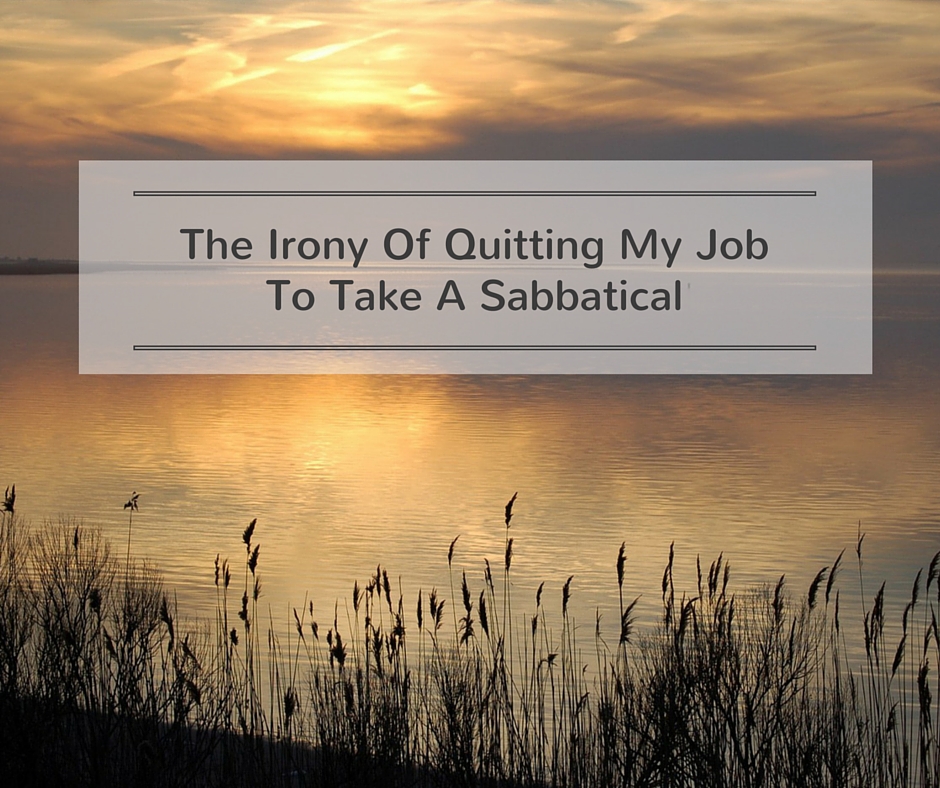
2014 was the year of change. Within that year, I worked up the courage to quit my job and take a six-month sabbatical without a plan of what I was going to do afterwards.
Before my decision to quit, I was on a soul-crushing career path within corporate finance.
Six months before I turned in my notice, I debated for, and against, the leap over dozens of sleepless nights. Two years ago, the thought of quitting my job without a plan was a laughable joke—a ridiculous and irresponsible whim only fools would consider.
But after years of practical despair, my soul made its break.
On the day I turned in my notice, I alternated between states of serenity and childlike giddiness. The last ten days I spent in the office, I felt as if a weight had been lifted off my shoulders. On my last day of work, I walked out of the office and never looked back (except to take a selfie).
I found myself with all the time in the world, nowhere I needed to be and nothing I needed to do—an experience I never had, not even as a child. I relaxed (to the best of my Type-A tendencies), learned new things, traveled and kept myself open to the possibilities.
Taking a sabbatical was simultaneously the best and most challenging decision I’ve made to date.
My sabbatical included reconnecting with family, fun moments with friends and remarkable travel experiences across the U.S. and in Prague. It also included dark periods that pushed my limits, challenged antiquated beliefs and taught me more about myself than I expected.
A week after I turned in my two-weeks notice, some coworkers asked me if I had any regrets or second thoughts. Weeks into my sabbatical, acquaintances asked me if I might go back to my company or within the finance field. Months later, as I considered the possibilities post-sabbatical, friends and colleagues commented on the adage that it’s easier to find a job when you already have one.
I regularly checked in with myself throughout the process for any inklings of regret.
The findings? None.
I never regretted my decision, even as I searched around the first couple months after my sabbatical ended or when the things I feared and warned myself against about taking the leap happened.
I had no regrets even during the moments when I wondered what the hell I was doing.
While I struggled in many ways, I ultimately came out much stronger than if I’d simply stayed where I had been for years, feeling stuck and carried along a path I didn’t want to be on. My perspective, skills and knowledge changed drastically as a direct result of the leap.
With everything that’s happened, I now see a sabbatical as one of the best ways to further your self-knowledge and growth.
There’s the creation of new when you separate yourself from old identities, roles and environments, even for a short period of time. For those open, willing and able to plan out a sabbatical (as short as a couple of weeks to as long as a year), I’d highly recommend it—but while keeping certain things in mind.
Over the following weeks, I’ll be sharing what I learned from quitting my job to take a sabbatical. This has been a long time coming, partially because I’m still muddling through the complexity in articulating all of the major internal and external changes, some of which are still in process.
My hope in sharing my experience—the trials and errors, fears, breakthroughs and learnings—is to encourage others to challenge what’s possible in their own lives. I used to think quitting my job to take a leap like this would be the end of the world, and in looking back, I now see the truth, irony and joy.
In a world that felt uninspiring and hopeless, the end of the world as I knew it was one of the best things that happened to me.
Read my next article in this sabbatical series on the four ways we hide from change.